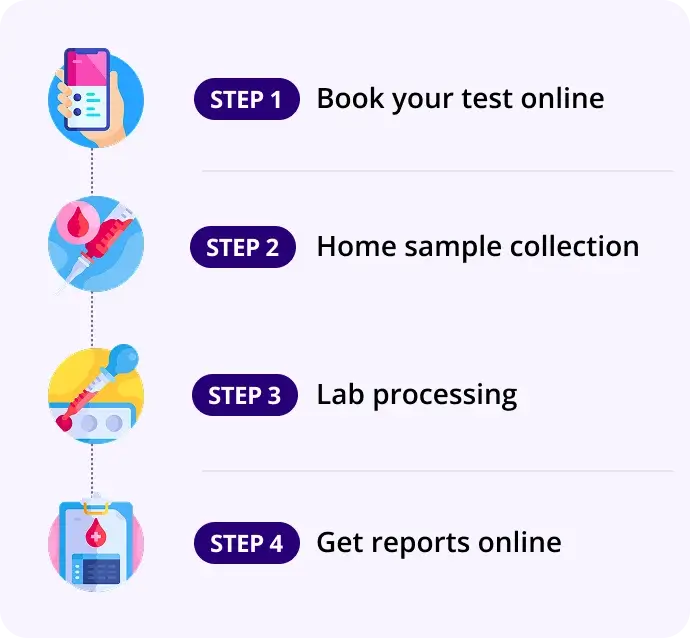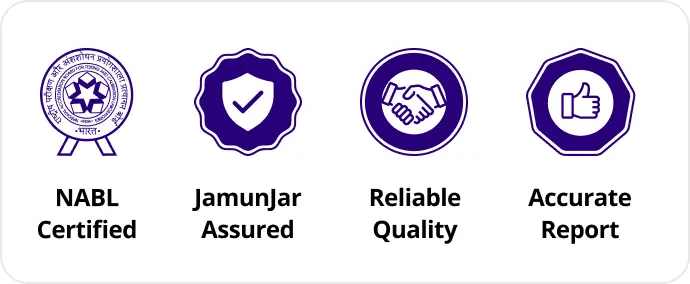Search for
eGFR (estimated Glomerular Filtration Rate)
Kidney
Report in 4Hrs
At Home
No Fasting Required
Details
It reflects the functioning of glomeruli, the tiny filters in the kidneys
₹149₹200
26% OFF
FREE:
Ai Insights
eGFR (Estimated Glomerular Filtration Rate) - Comprehensive Medical Test Guide
- Why is it done?
- Test Purpose: eGFR estimates the kidneys' ability to filter waste from the blood. It calculates the volume of blood filtered by the glomeruli (filtering units) per minute, expressed in milliliters per minute per 1.73 m² of body surface area.
- Primary Indications: Screening for kidney disease; monitoring chronic kidney disease progression; assessing kidney function before medication use; evaluating patients with diabetes or hypertension; detecting acute kidney injury; assessing suitability for kidney donation or transplantation
- Typical Timing: Routine screening during annual physical exams; regular monitoring (3-6 months) for patients with known kidney disease; prior to starting new medications that affect kidney function; when proteinuria or hematuria is detected; during evaluation of systemic diseases affecting kidneys
- Normal Range
- Reference Ranges (Adults): Greater than or equal to 90 mL/min/1.73m² (Normal kidney function); 60-89 mL/min/1.73m² (Mild decrease, Stage 1-2 CKD); 45-59 mL/min/1.73m² (Mild to moderate decrease, Stage 3a CKD); 30-44 mL/min/1.73m² (Moderate to severe decrease, Stage 3b CKD); 15-29 mL/min/1.73m² (Severe decrease, Stage 4 CKD); Less than 15 mL/min/1.73m² (Kidney failure, Stage 5 CKD or ESRD - End Stage Renal Disease)
- Units of Measurement: mL/min/1.73m² (milliliters per minute per 1.73 square meters of body surface area). The 1.73 m² adjustment standardizes results across different body sizes.
- Normal vs. Abnormal Interpretation: Normal eGFR (≥90) indicates healthy kidney function with adequate glomerular filtration. Borderline low (60-89) suggests mild kidney function decline but may be normal with aging. Low eGFR (<60) indicates chronic kidney disease and requires further evaluation and monitoring. Values <15 indicate kidney failure requiring dialysis or transplantation.
- Age and Sex Considerations: eGFR naturally declines with age (approximately 1 mL/min/1.73m² per year after age 30). Mild reductions in elderly patients (eGFR 45-60) may represent normal aging rather than pathology. Recent eGFR calculations now use race-neutral equations to eliminate historical racial adjustments.
- Interpretation
- eGFR ≥90 mL/min/1.73m² (Stage 1/Normal): Normal kidney function. No immediate intervention required. Continue preventive health measures and regular screening, particularly if risk factors for kidney disease exist.
- eGFR 60-89 mL/min/1.73m² (Stage 2/Mild CKD): Mildly decreased kidney function. May be normal variant in elderly individuals. Requires baseline assessment and monitoring. Implement lifestyle modifications; control blood pressure and blood sugar; manage cardiovascular risk factors.
- eGFR 45-59 mL/min/1.73m² (Stage 3a/Mild-Moderate CKD): Mild to moderate kidney function decline. Indicates established CKD. Requires regular monitoring (every 6-12 months), medication dose adjustments, evaluation for progression causes, blood pressure control, and nephrology referral if progressive.
- eGFR 30-44 mL/min/1.73m² (Stage 3b/Moderate-Severe CKD): Moderate to severe kidney dysfunction. Increases risk for complications including bone disease, anemia, and cardiovascular disease. Requires close monitoring (every 3-6 months), medication adjustments, nephrologist consultation, evaluation for CKD progression, and preparation for renal replacement therapy.
- eGFR 15-29 mL/min/1.73m² (Stage 4/Severe CKD): Severe kidney function decline. Requires very close monitoring (monthly), mandatory nephrology referral, aggressive management of complications, preparation for dialysis or transplantation, consideration of vascular access creation, and comprehensive pre-ESRD education.
- eGFR <15 mL/min/1.73m² (Stage 5/End-Stage Renal Disease): Kidney failure requiring dialysis or transplantation. Urgent nephrology evaluation essential. Initiation of renal replacement therapy, management of severe metabolic and cardiovascular complications, and coordination of transplant evaluation if appropriate.
- Factors Affecting eGFR Accuracy: Serum creatinine levels (muscle mass, diet, medications); age; sex; ethnicity; acute illness; dehydration; high protein intake; certain medications (NSAIDs, ACE inhibitors, angiotensin receptor blockers); pregnancy; obesity; amputations; muscle-wasting diseases; liver disease.
- Clinical Significance Patterns: Stable eGFR suggests chronic kidney disease without acute progression. Rapidly declining eGFR (>4 mL/min/1.73m² per year) indicates progressive kidney disease requiring aggressive intervention. Acute drop in eGFR may indicate acute kidney injury, dehydration, medication effects, or acute infection.
- Associated Organs
- Primary Organ System: Renal system (kidneys, glomeruli, and renal tubules). eGFR directly measures the filtration function of the kidneys' glomerular units.
- Secondary Organ Involvement in CKD: Cardiovascular system (hypertension, left ventricular hypertrophy, coronary artery disease); endocrine system (bone disease, secondary hyperparathyroidism); hematologic system (anemia); central nervous system (uremia, cognitive changes).
- Common Diseases Associated with Abnormal Results: Type 1 and Type 2 diabetes mellitus; hypertension; chronic glomerulonephritis; polycystic kidney disease; lupus nephritis; IgA nephropathy; membranous nephropathy; acute glomerulonephritis; pyelonephritis; nephrolithiasis; obstructive uropathy; renovascular disease; diabetic nephropathy; recurrent kidney infections.
- Potential Complications of Low eGFR: Chronic kidney disease mineral and bone disorder (CKD-MBD); secondary hyperparathyroidism; anemia requiring erythropoietin-stimulating agents; hypertension; cardiovascular disease; uremia; electrolyte imbalances (hyperkalemia, hyperphosphatemia); metabolic acidosis; progressive renal failure requiring dialysis; increased infection risk; cardiovascular mortality.
- Systemic Conditions Affecting eGFR: Systemic lupus erythematosus; antiphospholipid syndrome; vasculitis; scleroderma; multiple myeloma; malignancy; sepsis; severe dehydration; heart failure; liver cirrhosis; amyloidosis.
- Follow-up Tests
- Initial Confirmatory Tests: Serum creatinine (base value for eGFR calculation); Cystatin C (alternative marker of kidney function, less affected by muscle mass); Blood urea nitrogen (BUN) - assesses overall renal excretion; Urinalysis with microscopy - evaluates for proteinuria, hematuria, casts.
- Assessments for CKD Cause Identification: Fasting glucose and hemoglobin A1c (diabetes screening); Blood pressure monitoring; Lipid panel; Renal ultrasound or imaging (assess kidney size, echogenicity, obstruction); Renal biopsy (if etiology unclear or atypical presentation); Urine protein-to-creatinine ratio (UPCR) or 24-hour urine protein (quantify proteinuria).
- Complication Screening Tests: Electrolyte panel (sodium, potassium, chloride, bicarbonate); Phosphorus and calcium levels; Parathyroid hormone (PTH); Alkaline phosphatase; Complete blood count (assess for anemia); Albumin and total protein; Vitamin D levels.
- Cardiovascular Risk Assessment: Electrocardiogram (ECG); Echocardiography; Stress testing if indicated; Coronary angiography if chest pain or ischemia suspected; Lipid panel and lipoprotein(a) measurement.
- Immunologic Workup (if indicated): Antinuclear antibody (ANA); Complement levels (C3, C4); Anti-GBM antibodies; ANCA panel; Hepatitis serologies; HIV testing; Anti-phospholipid antibodies.
- Monitoring Frequency Guidelines: eGFR ≥60 (no CKD or mild): Annually or as clinically indicated; eGFR 45-59 (Stage 3a): Every 6-12 months; eGFR 30-44 (Stage 3b): Every 3-6 months; eGFR 15-29 (Stage 4): Monthly or as needed; eGFR <15 (Stage 5): Weekly or as needed; More frequent if rapidly declining or unstable.
- Pre-Dialysis and Pre-Transplant Evaluation: Nephrologist consultation; HLA typing and crossmatching for transplant candidates; Blood typing; Tissue compatibility testing; Psychosocial evaluation; Vascular access assessment (for dialysis); Infectious disease screening.
- Fasting Required?
- Fasting Requirement: NO - Fasting is NOT required for eGFR testing. This is a non-fasting test.
- Timing Considerations: eGFR can be measured at any time of day; patient may eat and drink normally before testing; no special timing restrictions apply.
- Patient Preparation Requirements: Maintain normal hydration; avoid strenuous exercise for 24 hours before testing; inform healthcare provider of all medications, especially NSAIDs, ACE inhibitors, and ARBs; avoid high protein meals immediately before testing if serial monitoring; inform provider of any acute illness or medications recently started or stopped.
- Medications to Report (Do NOT discontinue): ACE inhibitors (lisinopril, enalapril); Angiotensin receptor blockers (losartan, valsartan); NSAIDs (ibuprofen, naproxen); Diuretics; Corticosteroids; Amphotericin B; Cisplatin; Aminoglycosides; Trimethoprim. These medications can affect creatinine levels and eGFR interpretation but should continue unless directed otherwise by physician.
- Additional Test Information: Simple blood draw required; minimal discomfort; typically takes 5 minutes; results usually available within 24-48 hours; can be drawn at any laboratory or healthcare facility; insurance typically covers eGFR as routine screening.
How our test process works!

